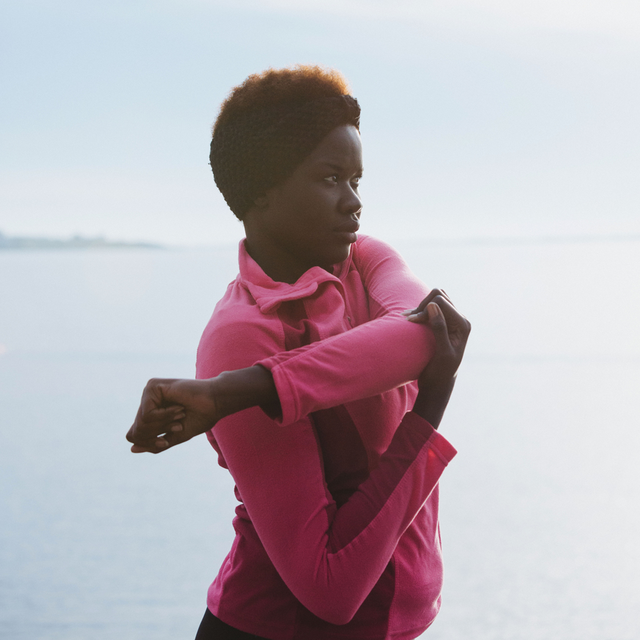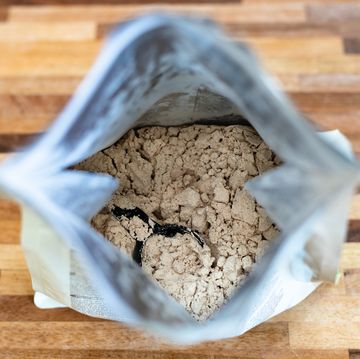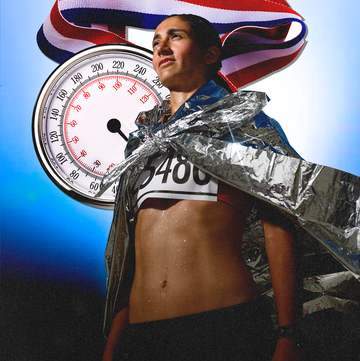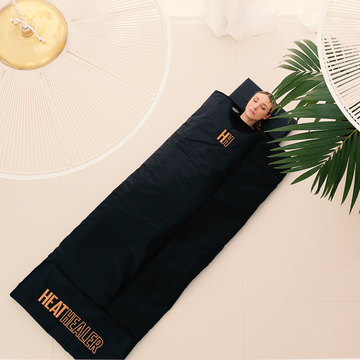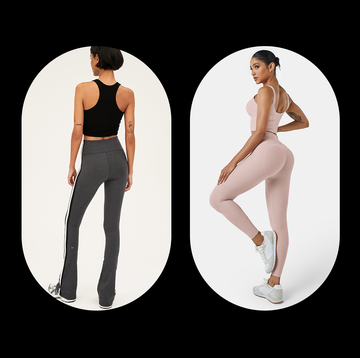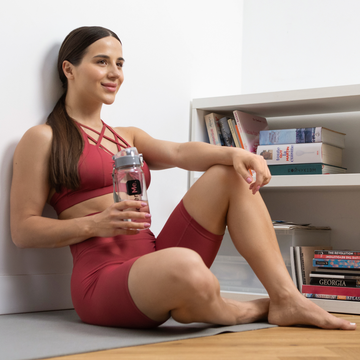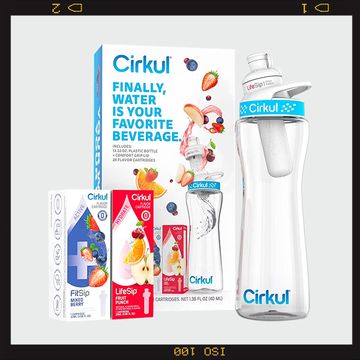Now is that lovely time of year in which we're about to be bombarded with alll the diet ads on IG, and now it's up to you to wade through that noise. Deciding to lose weight and make lifestyle changes is a super personal decision. It’s also a complicated, challenging, and often confusing endeavor that is overshadowed by diet culture myths, fatphobia, and the pressure to conform to whatever body type is trending. So before you make any changes to your diet (as in what you eat, not an eating plan) or life, there are some things you should know about the complexities of weight and weight loss.
First, it is important to examine how your life would be different if your weight changed, says Kimmie Singh, RD, founder of Body Honor Nutrition, a Health at Every Size (more on that in a minute) private practice. Rather than fixating over the number on the scale or looking a certain way, outline what a healthy life means to you. This can include chronic disease management, maintaining a sense of personal hygiene, engaging in behaviors that support your mental and physical health, and fostering healthy relationships, Singh says.
Know that losing weight or having a smaller body doesn’t make a person healthier. “Weight loss is not always necessary for optimal health,” says Linzy Ziegelbaum, R.D., founder of LNZ Nutrition. “Different people have different ‘healthy’ weights, different medical backgrounds, and different medical needs.” So, no, “losing weight” and “improving your health” don’t go hand in hand.
That overdue realization shifted the way many health pros think about weight and health, making the Health at Every Size (HAES) movement—which calls for size acceptance and promotes sustainable lifestyle changes like balanced eating and enjoying physical activity when possible—A Thing.
The realistic approach to embracing HAES starts with unlearning diet culture—which can be hard AF, since it is so heavily ingrained into our daily lives and has been for far too long (thanks, body-shaming tabloid covers, trend diets, and fatphobia). Recognize how diet culture is impacting your relationship with food, health, and your body. Singh recommends seeking out books, articles, or podcasts that cover topics like anti-dieting, HAES, body positivity, and intuitive eating to help undo the lifetime of diet culture BS we have all been spoon-fed.
Here's the truth: Fat shaming someone (or even yourself) does not help them (or you) get healthier. Weight stigma and fatphobia actually causes significant harm to ALL people. When healthcare professionals, nutritionists, and society focus on preventative healthcare (like regular checkups), habits, and physical and mental health (NOT body size), all of us will be happier and healthier.
Second, setting out to lose weight as fast as possible basically never turns out well. “Many people who lose weight quickly are not doing it in a healthy way,” Ziegelbaum says. Cutting out entire food groups (like refined carbs or dairy), drastically limiting calories (1,200 calories a day is NOT enough), and overexercising take a huge toll on mental health and lead to disordered eating patterns, Ziegelbaum says. “Experiencing pleasure and satisfaction are important parts of having a healthy relationship with food,” says Singh. So don’t be afraid to enjoy your beloved Flaming Hot Cheetos (IYKYK) or a slice of greasy pizza at the end of a night out.
Plus, when your sole focus is fast weight loss, you might feel like a failure when it doesn’t come off as quickly as you hoped. Ya see how this mentality ruins everything?
Finally, focusing on developing eating and exercise habits that are accessible and enjoyable to you is the healthiest approach to losing weight. Eating nourishing foods that make you feel energized, getting in some movement every day, sleeping at least eight hours each night, and finding ways to stress less all factor into maintaining a healthy weight. This approach enables you to reach your goal without feeling deprived or miserable.
Here, we asked women to share their tips for a healthier lifestyle, like balanced eating and exercise changes, that helped them maintain their weight over time. Their advice might not work for you, and that’s totally fine.
Gessi Parisi-Rodriguez, 25
Alexandria, Virginia
1. Start in your comfort zone. Parisi-Rodriguez started her fitness journey by putting one foot in front of the other. "The thought of walking into a gym and working out terrified me. So I started walking around my block instead—something I was already comfortable doing."
Alex Wittner, 23
Sarasota, Florida
2. Score fitness class freebies. As a big fan of ClassPass, Wittner found that many local studios offer free trials or super discounted rates for newbies. “Take advantage of it! The worst thing that can happen is you did not like it and you used up an hour of your day,” she says.
3. Give the weight room a chance. Weightlifting can be super intimidating at first, but Wittner discovered just how energizing lifting is once she joined a local gym. On days when pumping iron at the gym doesn’t fit into her schedule, she bows down to YouTube and Insta, where there are free tutorials galore.
4. Eat the pizza. And the ice cream! Depriving yourself of any food never accomplishes anything, she says.
Shannon McDaniel-Posey, 32
Slidell, Louisiana
5. Give yourself a freaking break. “Life is too short to beat yourself up,” she says. Despite what diet culture wants you to think, you can still be healthy if you don’t get in a workout one day or have a couple of margs at happy hour.
Tanique Johnson, 26
New Jersey
6. Cancel the whole “but I need a trainer!” narrative. Sure, working with a professional can be a big help, but it’s not necessary if you want to develop healthier habits and manage your weight. “I never had a trainer or a nutritionist, but knowing what I wanted helped me stay consistent and changed my lifestyle for the better,” Johnson says.
7. Balance your plate. A meal doesn’t have to be super complicated to be both nutritious and satisfying. Protein + veggies + whole grains = dinner is served. Johnson says that adding more proteins and veggies to her plate was an easy way to make her meals fulfilling. It makes sense: Protein, nutrient-dense produce, and fiber-rich whole grains do an excellent job of filling you up and keeping you that way for longer.
Jessica Beniquez, 24
Tampa, Florida
8. Get all up in nature’s candy. I think we can all agree that a Reese's PB Cup hits differently than an orange. But when you are looking for something sweet that is packed with vitamins, minerals, and nutrients your body needs, like fiber, then fruit is a great option.
Mayra Arias, 35
Laguna Beach, California
9. Cook a week’s worth of food in one go. “It’s the best way to stay on track,” Arias says. Having a healthy, balanced meal ready to heat up and eat takes the guesswork out of it and makes it easier to make healthy choices when you’re really hungry. Try prepping a few different things each week so that you can get a good mix of flavors and nutrients. (Eating the same thing every single day is boring anyway.) Some of Arias’s favorites include egg roll in a bowl, chicken broccoli Alfredo bake, one-pan salmon with veggies, and chicken parmesan.
Suzanne Ryan, 35
San Francisco Bay Area, California
10. Build confidence with baby steps. “One small step kicked off some bigger changes and confidence in my ability to stick to something,” Ryan says. “Small changes can lead to big results—so if you’re feeling overwhelmed, start with one thing, then add on.”
11. Focus on you. “Do what works for you and don’t compare yourself to others,” she says. “Everyone is different and there is no one-size-fits-all approach.”
Shanna Fichera, 31
Camarillo, California
12. Start small. "I began walking or jogging for 15 minutes a day. I worked up to 30 minutes and then increased it again. It was a very gradual process."
13. Don't give up when your progress plateaus. "I remember hitting the first plateau and feeling so defeated, but you have to push through and keep putting in the effort for your plan to work. You can't get discouraged."
Maria Gordon, 31
Upper Marlboro, Maryland
14. Make your old favorites healthier. "I've always loved burgers and fries, so I also started making healthier versions of foods that were familiar to me, like turkey burgers with wheat bread and sweet potato fries." Healthy alternatives can be equally yummy, but remember it is totally okay to hit up Shake Shack (or In-N-Out, for our west coast friends) when you are craving it.
Alyssa Ann Heidemann, 34
Sioux Falls, South Dakota
15. Eat your veggies. Heidemann often turns to vegetables for a quick and easy snack. Pro tip: Slice up veggies—like carrot sticks, bell peppers, celery, and zucchini—at the beginning of the week so you’ve got them locked and loaded for easy snacking when you need them. Oh, and don’t forget your fav dressing to dunk 'em in.
16. Pack snacks for late nights at work. Late shifts are a KILLER, and when that 9:30 p.m. hunger kicks in they are even worse. “I bring food and snacks to work so when I get home I'm not starving,” she says. Eating when you’re hungry is never a bad thing. Never.
Sara Lugger, 39
Oxford, Michigan
17. Move during your lunch break. "During my lunch, I'll walk on the treadmill at work or outside for 30 to 40 minutes,” Lugger says. Getting some fresh air and sunshine is also a great way to boost your mood and shake off some stress.
18. Eat more often. You may do better eating more small meals throughout the day instead of three big ones, if you happen to be hungry at those times and/or are able to take frequent work breaks. Lugger says she switched from three meals a day to six small meals a day. For the same reason, it’s great to have healthy snacks locked and loaded. Eating more frequent meals may make it easier for you to feel satiated. Or, it may not work for your lifestyle, and that's completely okay too.
Stephanie Aromando, 31
Sandyston, New Jersey
19. When you lift heavy, you can feel even stronger. "After about four months of training, I was able to squat holding 360 pounds," Aromando says. And nothing can match that freaking strong feeling. Again, it takes months of working out and lifting to get to that level. If you find that lifting weights gives you powerful vibes, start small (consult with a trainer if you want or turn to those trusty YouTube tutorials) and work your way toward heavier weights.
20. Keep things moving. Physical activity doesn’t always need to be a structured, challenging workout. Simply moving a little every day can go a long way. Aromando makes her rest days active rest days, doing something low-impact like going for a walk around the neighborhood or following a yoga video on YouTube.
21. Drink all the water. "I carry a gallon of water with me all day long until it's finished. Dragging it around campus looks ridiculous, but I don't care."
Tanisha Shanee Williams, 33
Brooklyn, New York
22. Put on music when you don't feel like going to the gym. "Being physically active has nothing to do with going to the gym, but moving your body is what matters. When I don't want to go, I just turn on my music and either dance or hula hoop with my niece."
Jade Socoby, 28
Bangor, Maine
23. Find a physical activity you actually enjoy. "Cardio really bores me. Powerlifting is what changed and saved my life." The best workout really is the one that you’ll actually do, so try out a bunch of different forms of movement until you find your groove.

Elizabeth Narins is a Brooklyn, NY-based writer and a former senior editor at Cosmopolitan.com, where she wrote about fitness, health, and more. Follow her at @ejnarins.

Olivia Wagner is a freelance writer whose interests include LGBTQ+ issues, fashion, and mental health advocacy. She/her. Find her on Instagram at @liviewags.
